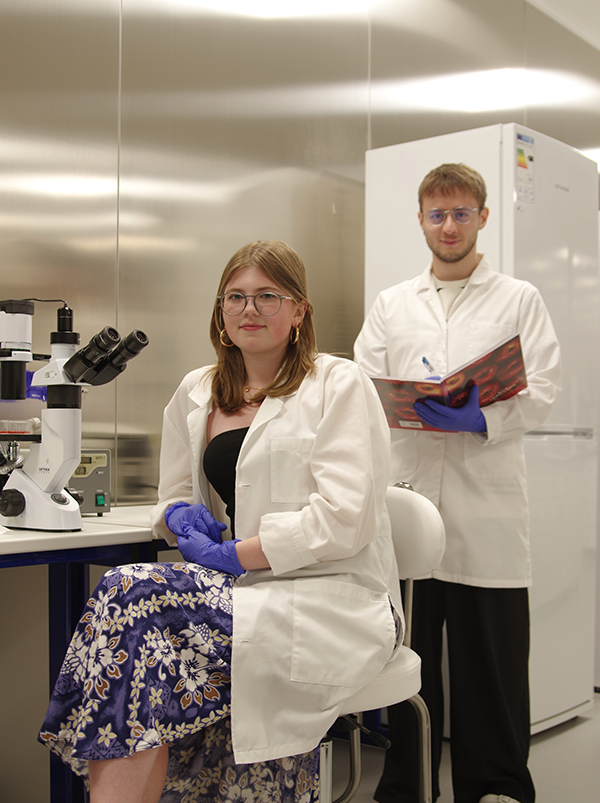At the Institute of Physics of the Czech Academy of Sciences, two young interns are teaming up to explore how mechanical forces affect cancer cell metabolism.
Riccardo, from Italy, just finished his molecular biology degree in Padova and is spending his gap year exploring science across Europe – from marine mammals in Greece to cancer cells in Prague.
Amelie, a Prague native now studying biomedicine at King’s College London, is no stranger to the Czech Academy of Sciences. She previously worked on lung cancer research at Biocev as part of the Otevřená věda programme, which she won.
Now they’re working side by side in the Laboratory of Biophysics bringing together their passion and curiosity.
What are your main responsibilities in the lab?
Riccardo: I don’t think we have many responsibilities in the lab. We are there to help and provide support where it’s possible. But other than that, we are there to learn. When it comes to me specifically, in the lab, I help with general maintenance, so cleaning of the lab, keeping the stuff we need well organised or also with some more sophisticated procedures like western blot and flow cytometry. These days, I’m deep into data analysis. We captured some images under the microscope, and now I’m working on extracting and interpreting the data they hold.
Amélie: I’m definitely more of a lab person – I’d rather be working with samples than sitting at a computer. On Thursday, I spent four hours in the microscopy room. Riccardo’s more into data analysis, while I enjoy learning different lab techniques. It’s interesting that in my previous lab at Biosafe, we did similar experiments but with completely different methods.
Have you noticed any differences between the scientific environment in the country where you study or studied and here in Czech Republic?
Riccardo: It’s hard to compare, because in Italy I only had experience in university labs during training sessions. I’ve never really been in a proper research environment where actual projects are being done. But what I can say is that the group was very kind to me, very open and they really, really like to help. I’m sure I would have found the same in Italy but unfortunately I haven’t had the experience yet.
Amélie: In the UK, I only worked in hospitals, so it’s not quite the same as being in a lab. But I guess it’s probably pretty similar overall. What I did notice though – especially in London – is that they’ve got way more new tech and machines that we don’t really have in Prague yet. When I got to see some of the stuff they use in labs like Pfizer, it was actually super cool.
How do you like your internship so far?
Riccardo: It’s been great! What I really like about this internship is that it gives me a chance to experience all sides of a researcher’s life. From the basic lab stuff like maintenance and keeping things organized, to more complex procedures, data analysis, and even engaging with other scientists and the public. I’m learning a lot of different things, which keeps it super interesting. Yeah, I’m enjoying it a lot because also it makes a program to the day. I’d rather have some kind of schedule than just chill the whole time, so this setup definitely works for me.
Amélie: Yeah, I’m honestly really grateful, ’cause I’m already learning and doing stuff that most first-years don’t usually get to, like proper lab work and all that. So just being able to do this kind of thing this early is actually a big deal for me.
And what’s really nice is how the team treats us. They don’t just give us random tasks to keep us busy, they actually get us involved in what they’re doing. It feels like we’re part of the team, doing actual work, not just watching from the side. Obviously, they don’t give us the super hard techniques straight away, which is fair, but overall it feels really fair and hands-on. And honestly, I didn’t expect that, so I’m really grateful it turned out like this.
Would you be open to pursuing another career internship/job in the Czech Republic in the future?
Riccardo: I can’t exclude that. Now I’m focused on this internship, but my next step will be a master in Bern, so in Switzerland. And after that, I’m not really sure where I’ll be. The intention now is to continue with a PhD. I don’t really know where. So maybe I’ll come back.
Amélie: I don’t know. For me, I hope to stay in London for a very, very, very long time. My priority is finding work, balanced life and also university life in London.
Would you recommend an intership in the Czech Republic to other students?
Riccardo: I would. And I did, to be honest. I was talking to a friend that studied with me back in Italy, and she was looking for an internship that kind of reminded me of the one I’m pursuing. So knowing that she has the same background as I do and that this here at FZU is a great environment to learn, I suggested her to come here.
Amélie: Yeah, me too. I feel like the opportunities here are bigger, actually. For example, in comparison to London, I feel like, first years are excluded for internships, mostly third years. So having the ability to have an internship here is huge. So I always recommend it to my high school friends or university friends as well.

